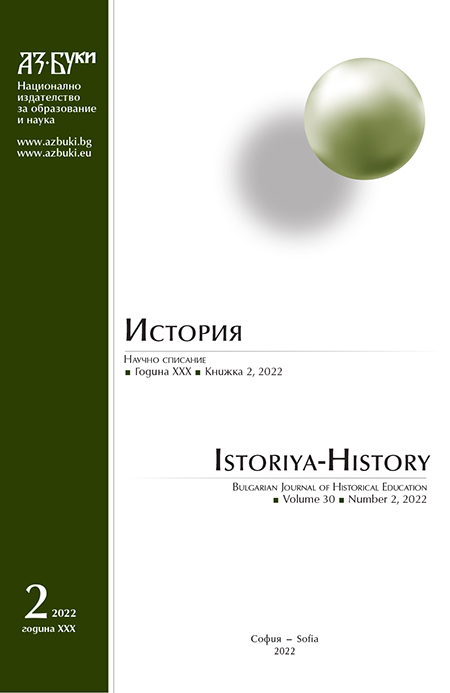
We kindly inform you that, as long as the subject affiliation of our 300.000+ articles is in progress, you might get unsufficient or no results on your third level or second level search. In this case, please broaden your search criteria.


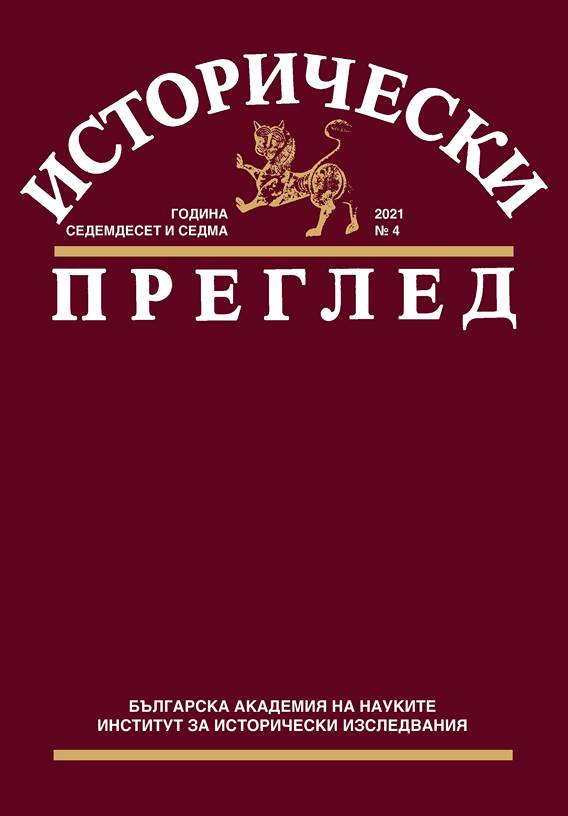
The article traces the initial period of the development of the Institute of Foreign Students in Sofia, Bulgaria (1963–1976). The institute was established in 1963 in order to meet the needs of a specialized institution which had to take care of the education of the citizens coming from the so called Third World countries. Students went through a preparatory department within one academic year. At the Institute they studied mainly Bulgarian language, but also general education and ideological subjects, and then continued their studies in secondary and higher Bulgarian educational institutions. The institution was important because it was the first place in which foreign citizens had the opportunity to get acquainted with the Bulgarian state and the regime, culture and customs of the People’s Republic of Bulgaria.
More...
The article is a continuation of a study published in 2012 in the journal “Historical Review” under the same title. Here the author summarizes data on Russian liturgical books delivered to the Bulgarian lands at the request and with the assistance of the Russian Vice Consul in Plovdiv Naiden Gerov. The information was found in the archive fund of N. Gerov in the Bulgarian Historical Archive at the National Library “St. St. Cyril and Methodius” (NBCM–BIA) after the publication of the study, published in 2012.
More...
The proposed article pays attention to a document that provides valuable information in two directions. The first one is related to the Christian moral norms typical for the period of the Bulgarian National Revival. The second direction is related to the public self-organization and charity. The mentioned document is a letter (from 1860) sent by the notables of Tarnovo to their fellow countrymen in Ottoman Bulgaria, and in Romania (Bucharest) in order to help financially and morally their fellow-citizen Mihail Vasilev. He was a guild member (a furrier) and a merchant who became very poor in 1860. Probably the reasons for his pauperization were related to the specific economic and financial situation in the Ottoman Empire after the Crimean War (1853–1856). The negative factors caused by the war forced Mihail to leave the urban setting, and settle down in Romania. It is interesting to note that the spirit of Christian ethical norms (goodness, charity, compassion) influences the content of the whole document. The notables of Tarnovo urged their compatriots in the Bulgarian lands, and in Romania to help the needy and his family (a wife and five daughters). There are also some clues about merchants, their profession and wealth; the role of basic moral principles such as honesty. Last but not least, the discussed primary source can give the opportunity to assess the importance of self-organization of Bulgarians to help each other. Their social capital (social/entrepreneurial networks and contacts based on mutual trust) played an important role in such philanthropic activities.
More...

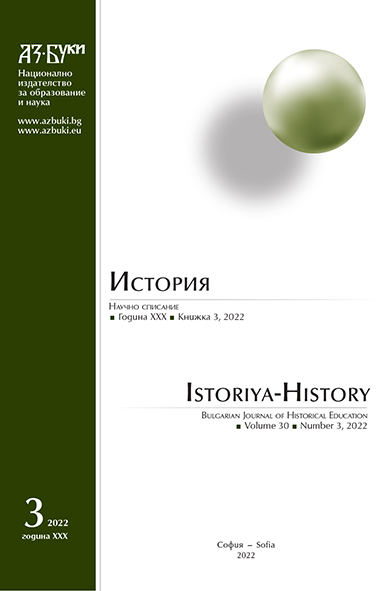
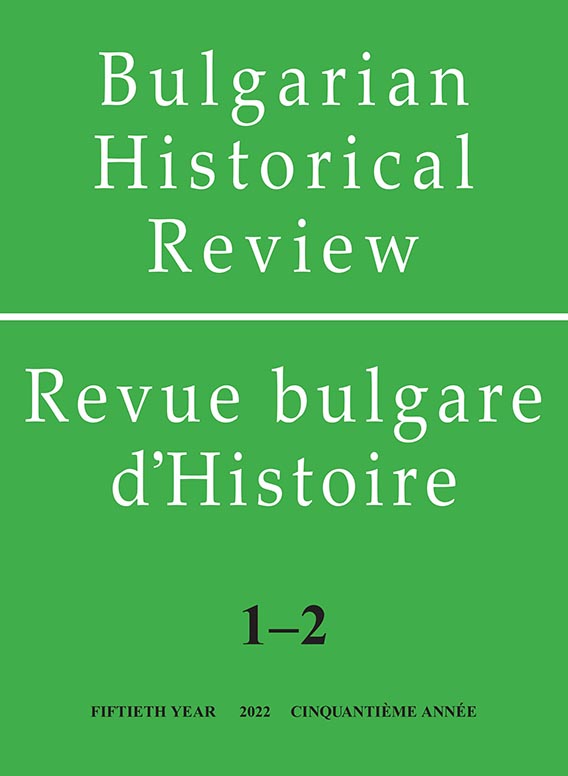
The period under study is conditioned by the author’s interest in the period of modernization and Europeanization of Bulgaria, coinciding with the peaceful years of the reign of Prince/King Ferdinand (1887–1912). These were two and a half decades of upsurge in practically all spheres of state development, which yielded brilliant results due to the united efforts of the Crown and the political class. Logically, this effective development not only did not pass by, but also manifested itself in the sphere of the armed forces, which had gone the long way of their modernization from a small and inexperienced army after the Liberation to the strongest militarily Christian state on the Balkan Peninsula on the eve of the Balkan Wars. Without pretending to be exhaustive, the study offers an overview of the development of the Bulgarian armed forces in the period 1887–1912 in the context of the reign of Prince Ferdinand. It deals with issues such as: the state of the army from the Liberation to the end of the Interregnum (1879–1887); the gradual positive change in the field of modernization of the material and training base of the soldiers and officers; the modern legislative activity of the time; the rearmament of all branches of the army using the most modern Western systems; the establishment of the Institute of Reserve Officers and of the Army Reserve Cadre; the training of officers and sergeants in Bulgaria and abroad (with emphasis on the posting of officers to Russian and Western European training establishments and academies). Important problems are not overlooked, such as the development and maintenance of the cavalry stock and base, the creation of military intelligence, the emergence and development of the problem of Bulgarian soldier and officer uniforms and their direct dependence on the foreign policy context of the time, etc. Among the main contributions of the study is the juxtaposition of the two first Bulgarian rulers, Prince Alexander I and Ferdinand I in their attitude to the military theme and its protagonists, both in practical and political terms. No less interesting is the consideration of the question of the attitude of the two heads of state towards the senior officers and their ability to lead and turn them into instruments of their aims and intentions.
More...
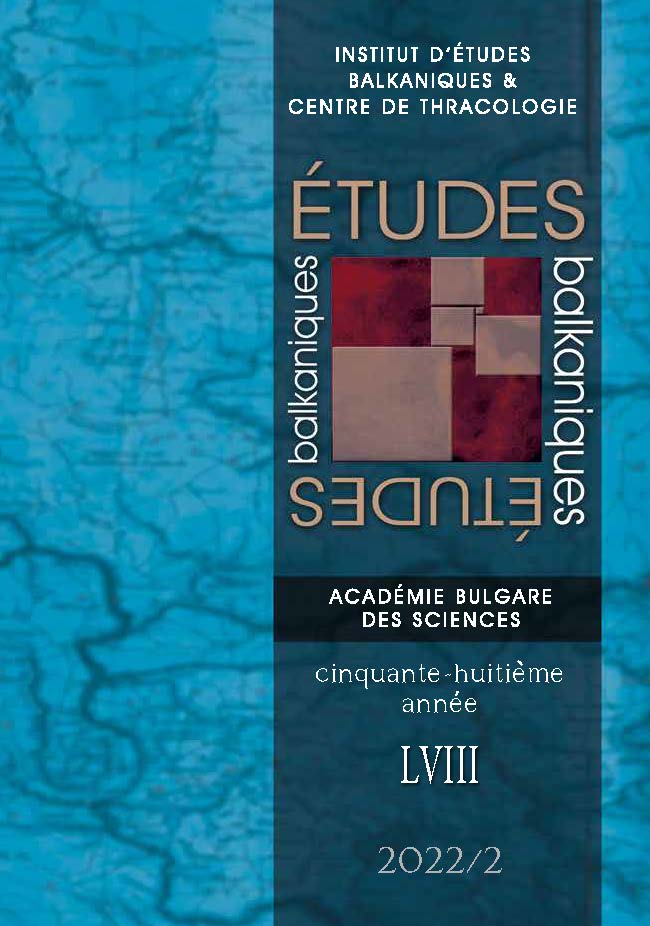
The study aims to identify some of the worries, difficulties, and dissatisfactions experienced by certain categories of inhabitants within Moldavian towns. They had to face the changes brought to the economic system at the continental level, manifested in space which, from the 17th to the late 18th century, was under the overwhelming influence of the Ottoman economic system. Among the challenges experienced by the merchants and artisans in a changing world, such as that of the first half of the 19th century, I mention the organisation into guilds, the supremacy of the western economy, the first attempts to constitute a free market, as well as competition and protectionism. Such transformations influence individual and mostly group attitudes, through the invocation of old privileges and traditions or the protection of the representatives of local power or foreign consulates. They also invoked, in a rather confused manner at first, but then increasingly more clearly, the value of free trade. The disturbance of the old order and the volatility of the new one left traces in the files within various collections of the Archives in Iaşi; the study relies on these sources.
More...
The present article looks briefly at the history of the Roman Catholic Congregation (the Daughters of Charity of Saint-Vincent-de-Paul) who proclaim the Gospel among the Levantine peoples. The religious institute of women devoted to active charitable work. They settled in Ottoman Salonica around the 1850s. Their activities were closely linked to those of the Lazarists, depending on the same superior of the Mission. Referring to the French archives of their house in Salonica and personal documents, the author briefly presents the objectives of their mission, which, until 1913, was facilitated by the Franco-Ottoman capitulations. The schools of Daughters of Charity were attended by children of different nations, including Bulgarians. The text is an initial attempt to study the schools of the women’s congregations in the Balkans.
More...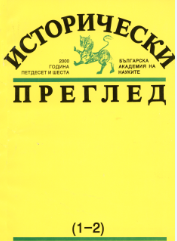
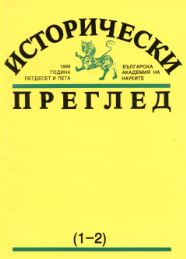
The town of Cherven was one of the important administrative, cultural and ecclesiastical centers during the Second Bulgarian Kingdom. The written information, which is very scarce, and the archeological studies show that the conditions created during the early centuries of Ottoman domination, a chiefly the destructive consequences of the aggressive campaign of Ali Pasha in 1388 caused the decline of Cherven. Despite the attempts to preserve some of its basic functions, the new realities affected the vitality of the town. The development and rise of the nearby town of Rousse which Cherven could not oppose, had a devastating effect. Thus in the 17th c. the town of Cherven turned into a small village. Notwithstanding the irreversible decline of the town of Cherven, it contributed to preserving the chiefly Bulgarian character of the majority of the settlements in the valley of the Roussenski Lom river.
More...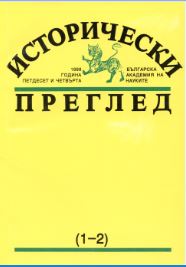
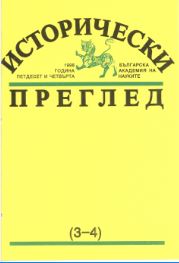
The peculiar interpretation in French literature of the subject of the “Crusades”, made by politicians and men of letters after the formation of the Ottoman Empire, is examined. Born in the Middle Ages, the so-called “crusades idea” was transformed in time according to the actual political situations. It retained its external form, went through internal metamorphoses and in the 18th c. grew into the so-called “Eastern Question”. On the other hand, at the same time French historiography of the 16th – 18th c., written by armchair men of letters, reflected a bygone age – a dream which the thinking of the Enlightenment fully destroyed. In the 19th c. the deposits of the two currents led to the publication of series of mediaeval French and other chronicles the interpretation of which rested at the foundation of positivism in science.
More...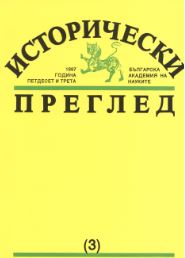
The question of the political and judicial responsibility of ministers was included already in the Turnovo Constitution with the clear awareness of its necessity and from then on it existed in all the drafts and proposals for changes in the fundamental law up to 1947 inclusive. After that public opinion was deliberately diverted in another direction in the search of guilt so that in the last two constitutions (of 1971 and 1991) the responsibility of ministers was tacitly overlooked, and in the Criminal Code the ministers were put on the same footing with officials. The article examines the nature of political responsibility and also the question of judicial responsibility – how it is proceeded, who has the initiative for seeking judicial responsibility, who tries the ministers and what are the possibilities for imposing effective punishment. The constitution drafts of 1935, 1936, 1946 and 1947 are presented and their common features and differences are indicated. From the presented constitutions and constitution drafts it is evident that as regards the political (parliamentary) and criminal (judicial) responsibility of the ministers, the differences between them are neither so numerous nor so essential. The goal of the Bulgarian legislators over a long period of time was to create such constitutional provisions as would have a really restrictive effect on the work of ministers. Although every minister and every cabinet strive to ensure independence in taking decisions and in implementing the comprehensive policy of the government, it should be known also that the responsibility is exclusively of the Council of Ministers. Moreover – all action or inactions of the Cabinet are under the strict control of the legislative power. For any act, for any deed, the minister or the whole cabinet bear political and in certain cases criminal responsibility as wee. It is Parliament that supervises and controls their actions. In the constitutions and draft constitutions existing up to 1947 serious attention was paid to parliamentary responsibility. This was so because it was believed that if the National Assembly acted without allowing gross political passions get the upper hand (irrespective of whether it accused or justified the ministers) the possibility to commit a crime was strongly restricted. The controlling function of the National Assembly was therefore of particular importance also for the upward development of socio-political life and for the conformity with the law of the policy of the government. Unfortunately, both in the older and in the more recent history and also in our contemporary history Parliament and with it the governments, have often fallen prey to their own unrealistic political ambitions.
More...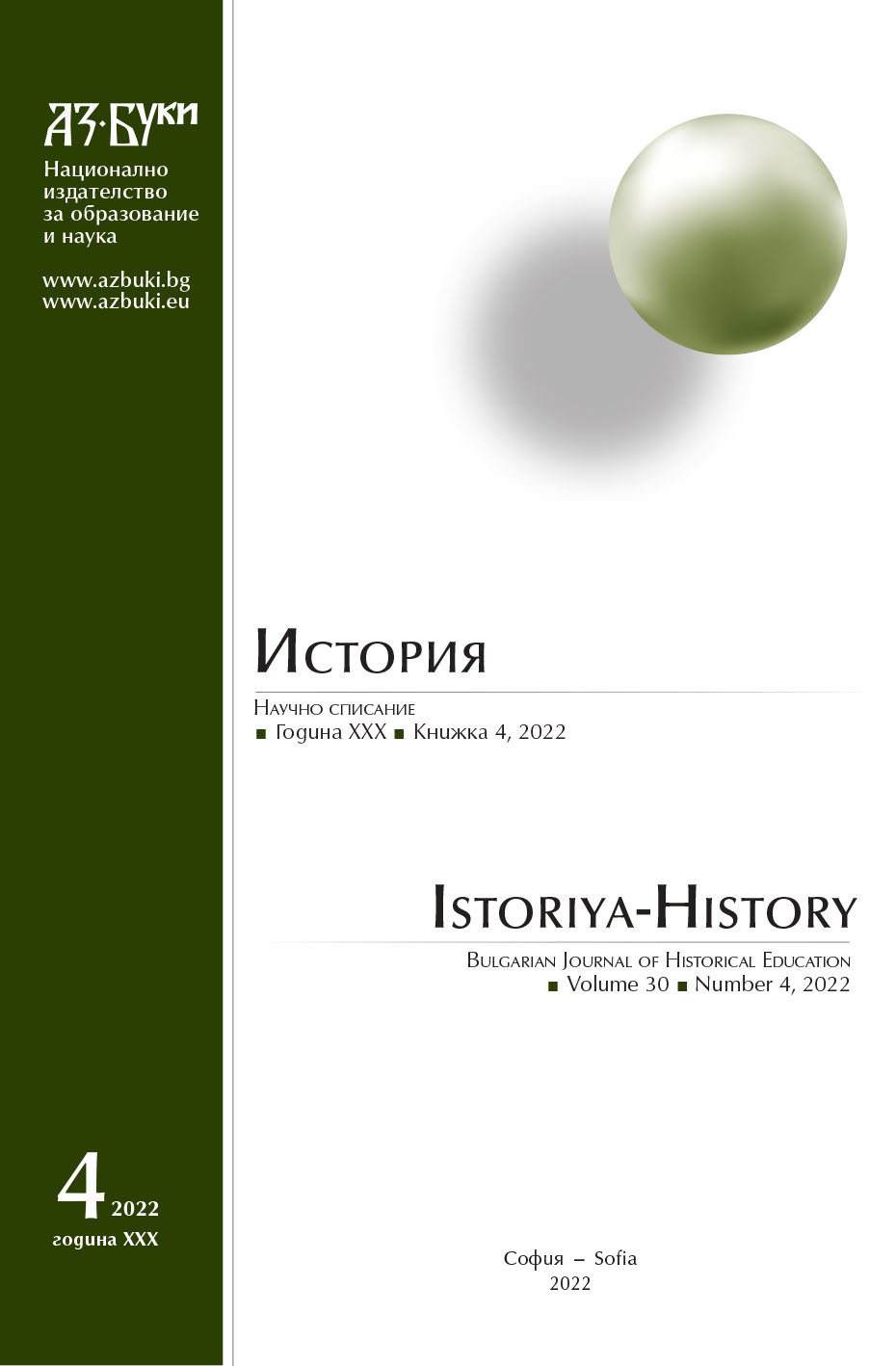
The publication is aimed at clarifying a hitherto unexplored topic, namely the early business activity of Evstati Selveli. By the term “early business activity” the author of the study means the period before the establishment of a joint partnership between Evstati Seleveli and hadji Mincho hadji Tsachev in 1841. The publication also provides information about the earliest, known at least for now, partners of Evstati Selveli – Evstati Andrea and Atanas hadji Nikolau (Nikolov). Information on these issues is derived from unknown and hitherto untranslated Greek-language documents. A certain exception are the cited in the study kondika of the Hellenic school in Tarnovo, read and translated by Vladimir Vladov and codes of the Holy Metropolis of Tarnovo, which are annotated and retold by Acad. Ivan Snegarov. So far, several authors have written about the origin and family environment of Atanas hadji Nikolau. The most complete, in this aspect, is the study of Elena Statelova which is dedicated to the history of the Panitsa family. Unfortunately, it is not known, at least to the author of the publication, if any of the researchers have found that this particular ancestor of the Panitsa family (his heirs adopted the surname Panitsa around 1879) was one of the earliest partners in the business of Evstati Selveli.
More...
The Black Death from the mid-14th century initiated a long series of recurrences of the disease with significant effects on the affected human societies. The current article explores the awareness of the plague epidemics and the experiences made by the Habsburg diplomatic representatives in Istanbul from the mid-1560s to the early 1590s. In the early modern Ottoman empire plague was a persistent and disturbing part of life, recurring at unpredictable intervals and affecting all levels of society. The studied correspondences demonstrate the common measures the diplomats took to protect themselves and their servants in times of plague outbreaks. The letters contain sporadic descriptions of various diseases. Besides the recurring plague epidemics, the diplomats mention and describe other illnesses which also caused fevers and were recognized as highly contagious but seem to be distinguished from the plague. The epidemiological experience of the residents in Istanbul is worthy of scholarly attention since the disease descriptions preserved in diplomatic letters could play a supplementary role in the establishment of a detailed plague chronology of the Ottoman capital.
More...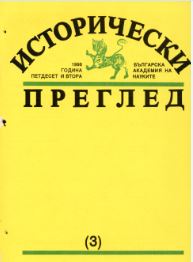
The problems of the foreign policy aspects of the Bulgarian national question (1878-1912) is one of the leading subjects in liberal historiography of the period 1878-1944. Formed under the influence of the European liberalism and historical positivism of the late 19th and early 20th c., Bulgarian historiography was distinguished by thematic variety, interdisciplinary approach, high theoretical and methodical standards and national loyalty. In the spirit of liberal positivism historians analysed the Bulgarian Question within the context of the geostrategic interests of the Great Powers in the Balkans (as part of the Eastern Question). The historical writings objectively reflected the tendencies in Bulgarian foreign policy: 1. Satellitism which was a common "complex" of the small Balkan states; 2. The striving for independent foreign policy, realized to a certain extent during Stefan Stambolov’s cabinets. A number of authors advanced the thesis that the genesis of the foreign policy conflicts in the European South-East was expressed in the confrontation of the European nationalist conceptions: Pan-Germanism, Pan-Slavism, Pan-Turkism, British and French neo-colonialism. The active interference of the Balkan nationalist conceptions found practical realization in the clashes between the armed and cultural-religious propagandas.
More...